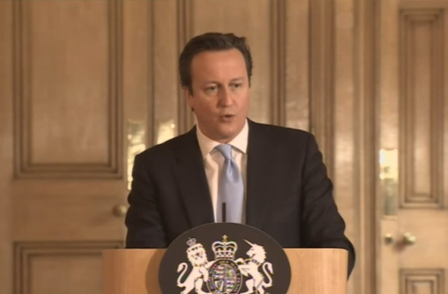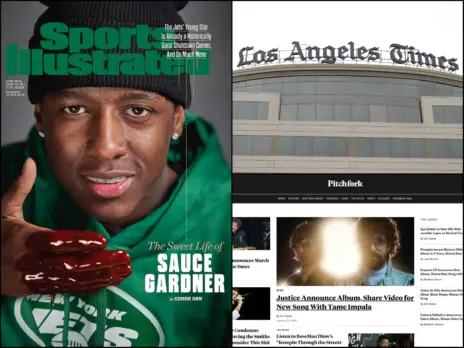
David Cameron said that press owners would have refused to sign up to the system of press regulation backed by statute called for by Labour and the Lib Dems.
And he has confirmed that a Commons vote will be held on Monday over a new system of press regulation backed by Royal Charter.
He said: “The route I have set out is the fastest possible way to deliver the strong self-regulation body that Leveson proposed that can put in place million-pound fines, prominent apologises and get justice for victims in this country.
"The deal is there to be done, it is the fastest way to get proper justice for victims."
Cameron said: “A Royal Charter would ensure the independent self-regulation that Lord Justice Leveson recommended while simultaneously protecting the precious independence and freedom of the press.
"It follows the principles that Lord Justice Leveson set out. It would deliver up-front apologies, million pound fines, a self-regulatory body with independence of appointments and funding, a standards code, an arbitration service free for victims, and a speedy complaint handling mechanism.
"All of the fundamental principles set out by the Leveson Inquiry are met by the Royal Charter that we propose and all have been accepted by the industry over the last three months. In fact, in a number of areas, the media have accepted additional measures that go beyond Lord Justice Leveson's recommendations – these include a dedicated fund for investigations, making publishers accountable for all material including photos, and a whistle-blowing hotline.
"As a result of all of this, we have a workable system ready to go."
Cameron pointed out that Leveson said any self-regulation system for the press should be voluntary.
"There's no point in producing a system that the press won't take part in," he said.
"As Prime Minister I wouldn't be fulfilling my duty if I came up with something knowing that it wouldn't work.
"I believe that what we have on the table is a system that will deliver public confidence and justice for the victims.
"It's a system that would introduce the toughest press regulation this country has seen and a system that will defend press freedom in our country."
Cameron said he would publish the Royal Charter, and would then use amendments to the Crime and Courts Bill to table "the minimal legislative clauses needed to put in place a system of exemplary damages for any newspaper that chooses to remain outside the regulatory system".
He added: "This delivers what Lord Leveson proposed – namely, a strong incentive for newspapers to take part in the new regulatory system.
"I would urge all members on all sides of the House to support this approach."
Cameron said he wanted to unblock legislation which he said had been "hijacked" by amendments seeking to bring in clauses about press regulation.
He said: "What I can't do, and what I think would be wrong for the country, is to just sit back and watch while bill after bill going through Parliament is sort of hijacked by a set of clauses about press regulation.
"We saw that on the Defamation Bill, we saw that on the bill to introduce the very important Green Investment Bank, and if we did nothing we would see exactly the same thing on the Crime and Courts Bill, which establishes the National Crime Agency, an absolutely key reform for the safety and security of our country.
"So it is better to bring this to a head, to say to the House of Commons: 'Here is my approach, back it and we will get what we need in terms of press regulation'.
"But if other parties want to come forward with a different approach that can be voted on on Monday night and the House of Commons says that is the case, then our country will be sovereign and will decide.
"I think if everyone opts for a full-on Leveson solution, I don't think it would work, I don't think it is the right step forward for our country.
"I think it would be a mistake, but what I can't do with effectively a hung parliament is say that we will negotiate forever, never reaching a conclusion, and having bill after bill wrecked by these tactics. We need to bring this to a head, make a decision and, in my view, put in place something that can work, and work quickly."
He said the Government's clauses on exemplary damages would give the press "strong incentives" to sign up to the proposals. But he said the Government's legislation did not mention the roles and functions of the regulator and it does not legislate about the detail about press regulation.
He told a press conference he would appeal beyond his party for support.
Cameron said other parties would have the opportunity to table their own amendments to the Bill ahead of Monday's vote.
"To put it simply, they can back my amendments and support this Royal Charter and secure a workable new system that delivers the principles of Leveson's recommendations or they can grandstand and end up with a system that I believe will not work," he said.
"The only way we can help victims is through a system that actually works in practice."
Cameron said a "full legislative response" would be wrong on grounds of "necessity, practicality and fundamental principle".
Statutory regulation is not necessary to achieve the Leveson principles, he said.
And he said it would not be practical because "no system of self-regulation can work unless those who are being regulated participate in it".
He added: "Most important of all, I believe that detailed legislation is fundamentally wrong in principle. It is wrong to cross that Rubicon by writing key elements of press regulation into the law of the land.
"It is wrong to create a vehicle whereby politicians could in future impose regulations and obligations on the free press.
"And it is wrong to run the risk of infringing free speech and a free press in this way."
Cameron cited Sir Winston Churchill's dictum that the free press is "the unsleeping guardian of every other right that free people prize (and) the most dangerous foe of tyranny".
And he added: "He was right. We should always defend that principle, and I will."
Cameron told journalists the cross-party talks had been "good natured" and had made a lot of improvements to the Royal Charter.
He said: "Over time we have improved the Royal Charter but in my view there remains a handful, but quite a big handful, of issues where there is a pretty fundamental difference between the parties.
"My view is that if you go on and on discussing them I am not sure that we would close that gap. But more to the point we are coming to the end of the legislative session, we simply won't have an option on the table which establishes this self-regulatory body.
"So it is much better to get on and make that decision."
He added: "This is not about what the press wants, this is about having a set of rules which work and can be up and running rapidly. That involves compromise on all sides but in the end as Prime Minister you have got to come forward with a proposal and say 'right, this is the way forward, do you want this or do you want something else?'"
Cameron said he expected Conservative MPs to support the changes in the "normal way", adding that he would urge MPs from other parties to vote for the reforms.
Cameron denied that the Royal Charter plan had been worked out with the press saying: "There are lots of things in it that the press don't like. They don't like exemplary damages, they don't like what is in here on apologies.
"They don't particularly like a regulatory system that has £1 million fines but we do like that and it is necessary and it is going to happen.”
Email pged@pressgazette.co.uk to point out mistakes, provide story tips or send in a letter for publication on our "Letters Page" blog







